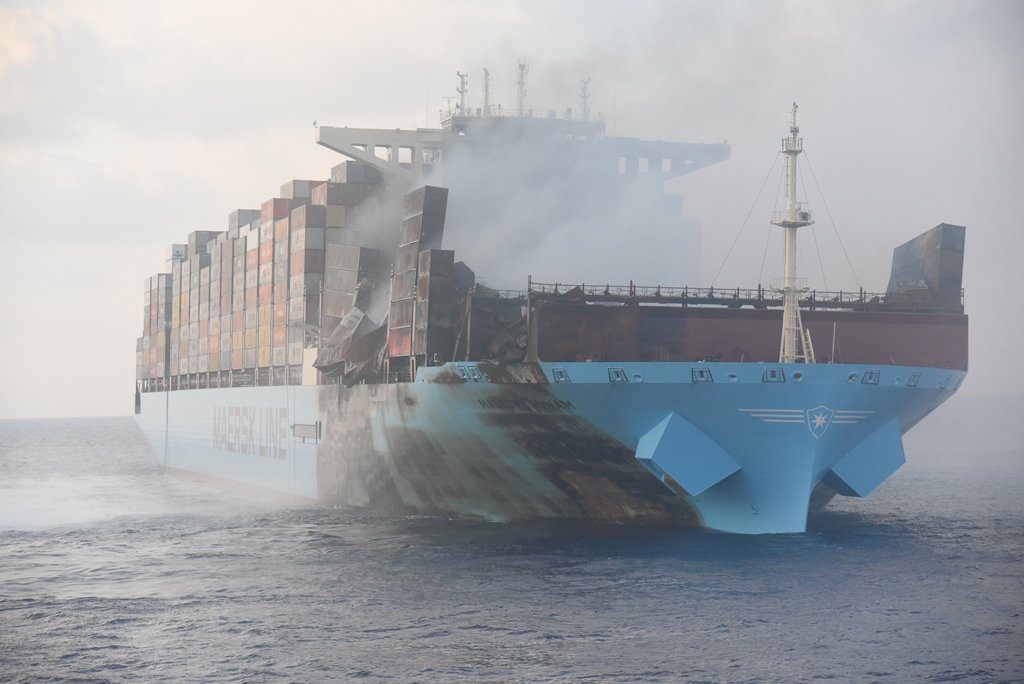
Insurers Brace for Multi-Million-Dollar Claims from Maersk Honam Fire
By Mike Wackett (The Loadstar) – The insurance industry is bracing itself for hundreds of millions of dollars of claims from the biggest container vessel casualty to date – but some shippers will not have been insured.
A Maersk spokesman told The Loadstar this week that no decision had yet been reached on the port of destination for the fire-damaged 15,262 teu Maersk Honam.
However, according to AIS signals received from one of the salvage tugs in attendance, the still-smouldering vessel is under tow, heading slowly in a NNE direction, which could suggest Mumbai as a port of refuge.
But before port authorities consider accepting the vessel on a lay-by berth, they will need to be convinced by the salvage teams that the container fires have been completely extinguished, which could take several more days.
In the case of the 6,750 teu MSC Flaminia, which caught fire in mid-Atlantic on 14 July 2013, it was almost two months before a North European port agreed to accept the ship alongside.
The 2017-built Maersk Honam caught fire on 6 March in the Arabian Sea en route to the Mediterranean, via Suez, claiming the lives of four seafarers with a further crew member presumed to be lost.
According to the Indian coastguard pictures, hundreds of containers in the fore section of the ULCV would seem to be a total loss, but boxes stowed behind the superstructure and in the aft section appear intact.
The Worst Containership Disasters in Recent History… In Photos
Maersk declared general average on 9 March and appointed Liverpool-based average adjuster Richards Hogg Lindley to collect the necessary GA security. It said it had advised cargo owners, including 2M partner MSC, of its decision to declare GA.
MSC requested its customers to contact their insurance company “so that your cargo can be released without delay”, adding: “We have not received any reliable information regarding the condition of your cargo, but we will be sure to inform you after we are notified”.
However, many of the shippers may not have arranged any marine cargo insurance and will therefore be in for a nasty shock when the average adjusters require a substantial deposit before the release of undamaged containers. The basic concept of GA is that all losses, including salvage, port and transfer costs are shared between surviving cargo.
Meanwhile, for cargo that was insured, marine reinsurance branches will be expecting an avalanche of claims for this latest containership casualty.
Insurers have for some time expressed their concerns about their exposure in the event of a major ULCV casualty. In the case of the 8,110 teu MOL Comfort which broke its back off the coast of Yemen in 2008, resulting in a total loss of the ship and its 4,380 containers, the insured cargo loss alone was reported at some $300m.
Marine insurers typically calculate their average exposure per box at between $50,000-$100,000, but it was reported that amounts lost from the MOL Comfort were considerably higher, and there have been instances recorded by marine insurers where the value of a single pallet packed in a container has exceeded $1m.
The Loadstar is fast becoming known at the highest levels of logistics and supply chain management as one of the best sources of influential analysis and commentary.
Check them out at TheLoadstar.co.uk, or find them on Facebook and Twitter.













